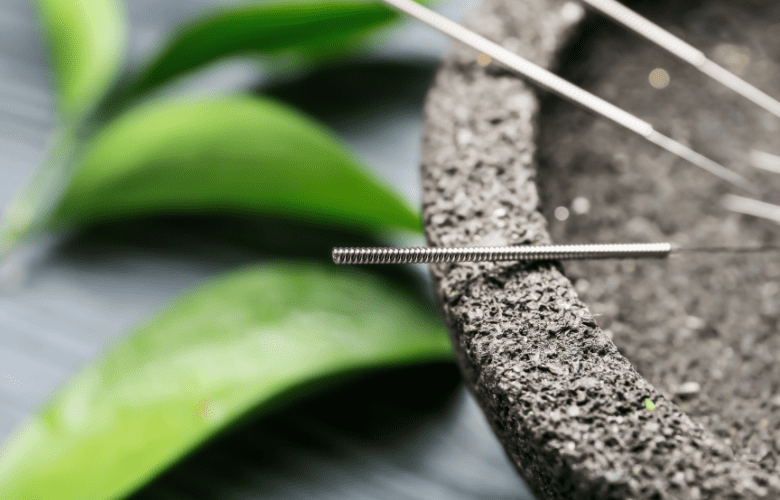3 Proven TCM Approaches to Heal Your Thyroid Naturally
Your thyroid is small but mighty. It controls your metabolism, energy levels, and even your mood. But when it’s out of balance, you might experience fatigue, brain fog, or stubborn weight gain. Traditional Chinese Medicine (TCM) offers natural ways to restore thyroid health. Acupuncture, herbal medicine, and dietary and lifestyle shifts are three proven approaches how to heal your thyroid naturally. In this article, we’ll break down how these methods work and how they can help you feel your best again.
Common Thyroid Disorders
Understanding thyroid disorders is the first step in managing thyroid health. In Western medicine, thyroid conditions are diagnosed based on hormone levels and categorized into common disorders:
Hypothyroidism (Underactive Thyroid)
Hypothyroidism occurs when the thyroid doesn’t produce enough hormones, slowing down bodily functions and leading to symptoms such as:
- Fatigue
- Weight gain
- Cold intolerance
- Dry skin
- Depression or brain fog
- Slow heart rate
The most common cause of hypothyroidism is Hashimoto’s thyroiditis, an autoimmune condition that attacks the thyroid gland.
Hyperthyroidism (Overactive Thyroid)
Hyperthyroidism happens when the thyroid produces too much hormone, speeding up bodily processes and causing symptoms like:
- Rapid heartbeat or palpitations
- Unexplained weight loss
- Anxiety or irritability
- Sweating
- Tremors
- Heat intolerance
Graves’ disease, an autoimmune disorder, is the most common cause of hyperthyroidism.
Goiter and Thyroid Nodules
A goiter is an enlargement of the thyroid gland, which can occur with either hypo- or hyperthyroidism. Thyroid nodules are lumps that develop within the gland. While most are benign, some can affect hormone production, and in rare cases, they may be cancerous.
Thyroiditis
Thyroiditis refers to inflammation of the thyroid, which may cause temporary hyperthyroidism, hypothyroidism, or fluctuations between both. It can be triggered by infections, autoimmune conditions, or postpartum changes.
How TCM Views Thyroid Health
TCM approaches thyroid health holistically rather than treating the thyroid as a separate organ. Instead of categorizing conditions based on hormone levels, TCM identifies patterns of imbalance that contribute to symptoms.
In TCM, every individual is unique, and treatment is tailored to their specific pattern of imbalance. TCM connects the thyroid to three major systems:
- Kidney System – The root of life energy (Jing), the Kidneys influence metabolism and hormone balance. Kidney Yang deficiency is commonly associated with hypothyroidism, leading to fatigue, cold intolerance, and sluggish metabolism. Kidney Yin deficiency, often presenting with symptoms like heat, restlessness, and night sweats, may contribute to hyperthyroidism, though other imbalances, such as Liver Fire, can also be involved.
- Liver System – The Liver governs the smooth flow of Qi and blood. Liver Qi stagnation, often triggered by stress or emotional imbalance, can disrupt thyroid function. In hyperthyroidism, this may evolve into Liver Fire or Liver Yin deficiency, causing symptoms like irritability, heat, and palpitations.
- Spleen System – The Spleen is responsible for digestion and the production of Qi. When weakened, it can lead to dampness and phlegm accumulation, which TCM associates with goiter, thyroid nodules, and sluggish metabolism. Poor diet, overwork, and digestive weakness can contribute to this imbalance.
By identifying which organ system is out of balance, TCM practitioners create personalized treatment plans to restore harmony and support thyroid health.
3 TCM Approaches for Thyroid Disorders
Below are three key ways TCM supports thyroid function and overall well-being, promoting balance in both body and mind.
1. Acupuncture
Here’s how acupuncture benefits thyroid function:
Regulating the Immune System
Many thyroid disorders, such as Hashimoto’s and Graves’ disease, are autoimmune in nature. Acupuncture has been shown to modulate immune function by reducing inflammation and supporting immune balance, which may help stabilize thyroid antibodies over time.
Balancing Yin, Yang, and Qi
Acupuncture restores balance in the body’s energy flow by stimulating specific meridians, addressing different thyroid-related imbalances:
- Hypothyroidism (Yang Deficiency): Acupuncture strengthens Kidney Yang, boosting metabolism and energy.
- Hyperthyroidism (Yin Deficiency): It calms the nervous system, reduces heat symptoms (like anxiety and palpitations), and nourishes Kidney Yin.
Supporting Organ Systems Related to Thyroid Health
As mentioned above, the thyroid is connected to the Kidney, Liver, and Spleen systems. Acupuncture helps restore balance by stimulating key meridians:
- Kidney System
- Kidney 3 (Taixi), Kidney 7 (Fuliu) – Boost Kidney Yang for hypothyroidism.
- Kidney 6 (Zhaohai) – Nourish Kidney Yin to cool excess heat in hyperthyroidism.
- Liver System
- Liver 3 (Taichong), Liver 14 (Qimen) – Relieve Qi stagnation and stress-related thyroid imbalances.
- Spleen System
- Spleen 6 (Sanyinjiao), Stomach 36 (Zusanli) – Strengthen digestion, reducing dampness and phlegm linked to goiter and nodules.
Enhancing Blood Flow to the Thyroid
By stimulating key points along the meridians, acupuncture helps dilate blood vessels, reduce inflammation, and enhance microcirculation in the neck and thyroid area. Benefits include:
- Reducing Swelling & Nodules: Increased blood flow helps break down stagnation and clear excess fluids, potentially shrinking goiter or nodules.
- Regulating Immune Response: Better circulation supports immune modulation, helping with Hashimoto’s and Graves’ disease.
- Optimizing Hormone Transport: Improved circulation ensures efficient thyroid hormone distribution, stabilizing metabolism and energy levels.
Reducing Stress and Supporting the Nervous System
Chronic stress negatively impacts thyroid function by increasing cortisol levels, which can interfere with thyroid hormone production. Acupuncture activates the parasympathetic nervous system, promoting relaxation and reducing stress, which in turn supports thyroid health.
Regulating the Hypothalamic-Pituitary-Thyroid (HPT) Axis
The HPT axis is the body’s built-in thermostat for thyroid hormone production. It’s a feedback loop between the brain and thyroid, with the hypothalamus and pituitary gland sending signals to regulate hormone levels. Acupuncture helps fine-tune this system by reducing stress-related imbalances and supporting the body’s natural ability to maintain healthy thyroid function.
A study in Global Advances in Health and Medicine found that acupuncture may help thyroid function by easing stress, which impacts the HPT axis. By calming the body’s stress response, acupuncture could support better thyroid balance in people with subclinical hypothyroidism (SHypo).
2. Chinese Herbal Medicine
TCM practitioners prescribe customized herbal formulas to address the underlying imbalances contributing to thyroid dysfunction. A review in the Journal of Ethnopharmacology showed that these herbs may help ease symptoms like fatigue, brain fog, and depression with no severe side effects reported.
Here’s how Chinese herbal medicine can help support thyroid health:
Balancing Yin and Yang
Specific herbs help to balance Yin and Yang in thyroid disorders.
- Hyperthyroidism (Yin Deficiency): Sheng Di Huang (Rehmannia) and Zhi Mu (Anemarrhena) nourish Yin, cooling excess heat and calming symptoms like anxiety, insomnia, and rapid heartbeat.
- Hypothyroidism (Yang Deficiency): Rou Gui (Cinnamon Bark) and Fu Zi (Aconite Root) warm and strengthen Yang, boosting metabolism and energy levels.
Regulating Qi and Blood Flow
Below are herbs to promote proper Qi and blood circulation for thyroid function.
- Dang Gui (Angelica) – Nourishes blood and promotes circulation, helping with fatigue and cold intolerance seen in hypothyroidism.
- Chai Hu (Bupleurum) – Moves stagnant Liver Qi, reducing stress-related thyroid imbalances, especially in hyperthyroidism.
Supporting Organ Systems
Supporting the different organs with the right herbs can help restore harmony and improve overall thyroid function. Here’s how:
- Kidney System (Hormonal Balance) – He Shou Wu (Polygonum) supports Kidney Yin and Yang, which regulate endocrine function.
- Liver System (Stress & Emotional Balance) – Xiao Yao San (Free & Easy Wanderer) helps smooth Liver Qi flow, reducing stress-related thyroid imbalances.
- Spleen System (Digestion & Nutrient Absorption) – Huang Qi (Astragalus) strengthens the Spleen, improving digestion and energy production.
Reducing Inflammation & Supporting the Immune System
Chronic inflammation plays a role in thyroid disorders, particularly Hashimoto’s thyroiditis and Graves’ disease. Certain herbs help regulate the immune response:
- Huang Qin (Scutellaria) – Known for its anti-inflammatory and immune-modulating properties.
- Bai Shao (White Peony Root) – Helps calm an overactive immune system and reduces inflammation.
3. Dietary and Lifestyle Recommendations
TCM also focuses on restoring balance through diet and lifestyle to support thyroid health naturally. Here are key recommendations:
- Eat warm, cooked foods. Cold and raw foods weaken digestion, especially for those with hypothyroidism. Opt for warm soups, stews, and lightly cooked vegetables.
- Support the Spleen and Kidney Systems. Nourish the body with foods like bone broth, black sesame seeds, walnuts, seaweed (in moderation), and kidney beans.
- Reduce dampness and phlegm. Avoid excessive dairy, refined sugar, and greasy foods, which can contribute to goiter and nodules.
- Manage stress with adaptogenic herbs and teas. Herbal teas like chamomile, ginger, and licorice root can help calm the nervous system and support adrenal function.
- Prioritize rest and stress reduction. Getting enough sleep replenishes Yin and Blood, and practices like meditation, Qi Gong, Tai Chi, and deep breathing help regulate Qi and calm the Shen (Spirit), reducing stress-related imbalances.
- Stay warm and protect your neck. In TCM, exposure to wind and cold can disrupt energy flow. Wearing scarves in cold weather helps protect the thyroid.
- Engage in gentle movement. Exercises like yoga, walking, and stretching improve circulation and support Qi flow without overtaxing the body.
- Maintain a consistent routine. The body thrives on routine, so aim for regular meal times, sleep patterns, and mindful movement to support hormone balance.
- Avoid overexertion. Excessive physical or mental stress can deplete Yang energy, worsening hypothyroid symptoms. Balance activity with rest.
The Bottom Line
Your thyroid might be small, but it has a huge impact on your health. If you’re looking for ways how to heal your thyroid naturally, TCM offers a holistic approach that restores balance from the inside out. By combining acupuncture, herbal medicine, and diet and lifestyle changes, you can address the root causes of imbalance rather than just managing symptoms. Simple lifestyle shifts—like eating warm, nourishing foods, managing stress, and staying active—can make a big difference.
Want to support your thyroid health naturally? Healing Points Acupuncture can help you explore a personalized approach to balance and well-being.













